I know, I know. I’m poking the happily sleeping beast: Zutara vs. Kataang, the ship war to end all others. But ever since Jana made her detailed cause for the former, something’s been awakened in me.
For those unfamiliar with Avatar: The Last Airbender (rethink your choices), “Kataang” and “Zutara” refer to two relationship pairings that gained popularity in the fandom. One was between the protagonist, Aang, and his traveling companion Katara. The other was between the former-antagonist-turned-deuteragonist Zuko, and…Katara.
What’s funny is that they both had similar levels of “support” by the show’s narrative, at least for the better part of its three seasons, and they both played into rather common romantic tropes. For Kataang, there is the expectation that the “hero gets the girl,” and Aang was a straightforward “chosen one” who always had a romantic attraction to Katara. With Zutara, it was the “opposites attract”/“heated fighting” dynamic between two characters, who were both also the most attractive (maybe?), as well as both teenagers. Hormones, duh.
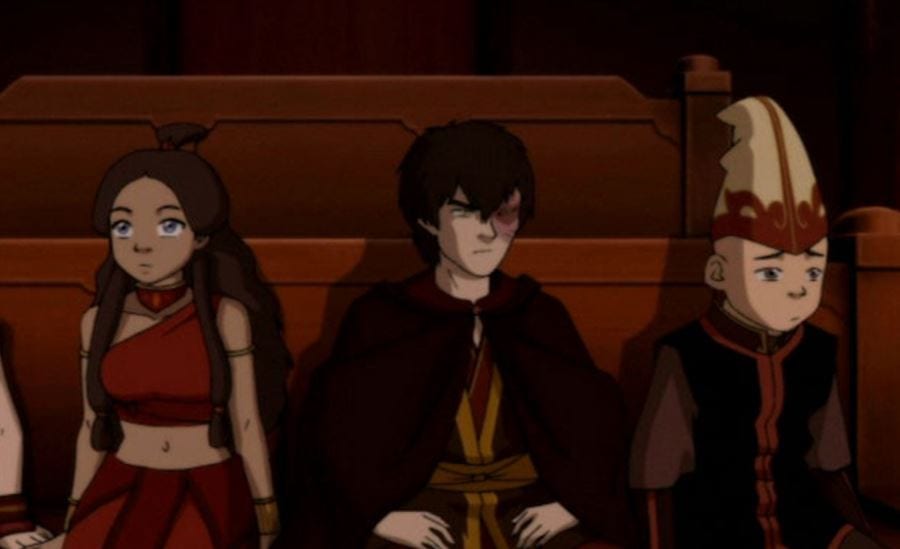
I should note: the romantic element of this show was one of the least important, at least from a storytelling perspective. There were a few “shippy” filler episodes, for lack of a better term, but it kind of took a backseat to the epic storyline wherein a sole survivor of genocide moved to fight against the imperialist nation that caused the destruction of his culture, while a former prince of that nation pushed towards healing to break the cycle of abuse with his father, while being forced into a situation where he had to fight against his sister. There was also some stuff about balance, and justice, and the death penalty, and energy, and the futility of revenge…
No, sorry. Back to the ships.
Kataang “won” over Zutara, and at the time, I remember thinking it felt forced, though not particularly caring. The longer and longer I’ve been thinking about it, however, the less compelled I’ve become, even to the point of anger. You see, as Jana summed up:
“So, I’m not one to argue that Kataang being endgame hasn’t been somewhat obvious from the get-go. It’s just that outside of three and a half instances, it has always been completely one-sided. It’s Aang falling in love with the first girl he sees, and getting the girl in the end. What is missing in there is a single scene on how Katara feels about the situation.”
What’s rather upsetting is because of that, this romantic story is not good for both Katara and Aang. However, I’ll never say “this shouldn’t have happened.” Confused? So is Katara.

Katara, Interrupted
I don’t want to retread too much ground already covered by Jana, but I’ll say that it is hard for me to track Katara’s romantic interest with Aang as well. And I’m sorry to open with this, but part of that is due to the age difference between them. Two years is hardly worlds apart (I’m personally working with four), but a 12-year-old boy and a 14-year-old girl are. Especially the way these two are drawn. Not to be too voyeuristic about Y7 cartoons, but Katara has clearly gone through puberty, while Aang hasn’t. There is something just…off, about a sixth grade boy having a full on make-out sesh with a high school girl.
Then, sue me, but Katara took on a very maternal role with Aang. Sure, she’s a caretaker and sort of a “mom friend,” but it’s a bit more than that. She served as his literal guardian during the show’s run—there’s just no other way to look at it. By the third episode, she called herself his “family,” and later even went on to role play as his mother to get him out of trouble at school. Aang, meanwhile, was… Well, I wouldn’t say “immature” for his age, because I’ve witnessed Julia’s son barging in on us recording a podcast too many times. However, Katara is 14 going on 25, while Aang is just, Aang.
I’m not saying people who take on maternal roles in life can’t develop feelings for someone who’s younger than them, or even that “mom friends” can’t date one of the people in their circle; I’m just saying I need a compelling case to be made for me to get over that, given its portrayal. I would argue that Avatar: The Last Airbender (ATLA) did little in that department. For every moment of potential romantic interest from Katara, we were given a moment of confusion, or hesitance, or complete disinterest, even. In fact, in the last season, Katara was shown to be uncomfortable each time Aang kisses her, and even went as far as to tell him to back off with the romantic stuff in the episode before the finale, because she was confused about how she felt.
Yet in the end, she just trots out and blushes at Aang, then happily makes out with him when he goes for it, so I guess the confusion was because she ate a bad burrito.
See, that’s really the thing: with Katara’s behavior in the show, an ending where she and Aang shake hands and declare themselves “best platonic friends for life” would have made just as much sense. Except she wanted to be with him in that last scene, so I guess that meant she had been interested. Which is kind of violating that “show, don’t tell” rule.
The post-canon comics only furthered the lack of exploration of her feelings in this relationship. She was probably the character that felt the most “off” throughout these, and a large part of that was because until North and South, she had barely any role outside of being Aang’s girlfriend. In fact, her position as his girlfriend informed her character actions first and foremost.
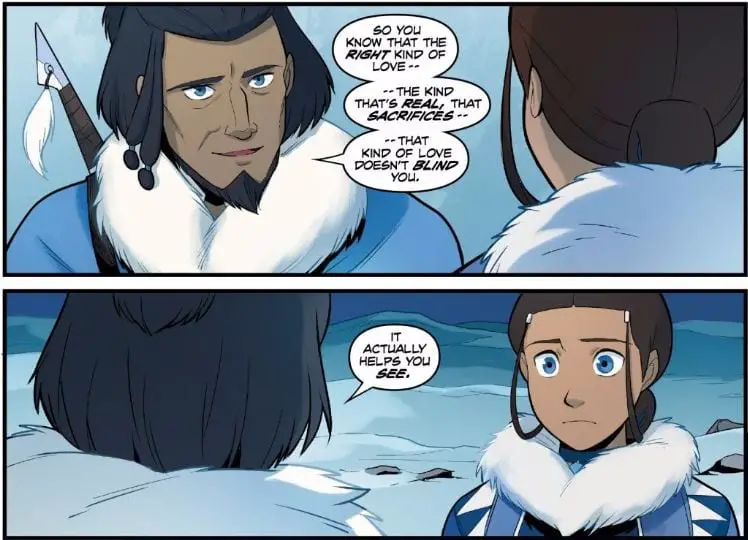
Seriously?
Katara is an exceedingly self-sacrificing character, but there’s self-sacrificing, and then there’s swallowing any emotional needs of her own. Or rather, not having those emotional needs ever articulated or explored by the media in which she appears.
The Promise was one of the worst offenders with this regard, since Katara got a mini-arc where she had to learn to be okay with Aang showing off for a gaggle of girls who were obviously flirting with him. Sort of exactly what happened in the fourth episode of the show, except this time Katara was in the wrong for being jealous, and Aang’s behavior was free of all issues!
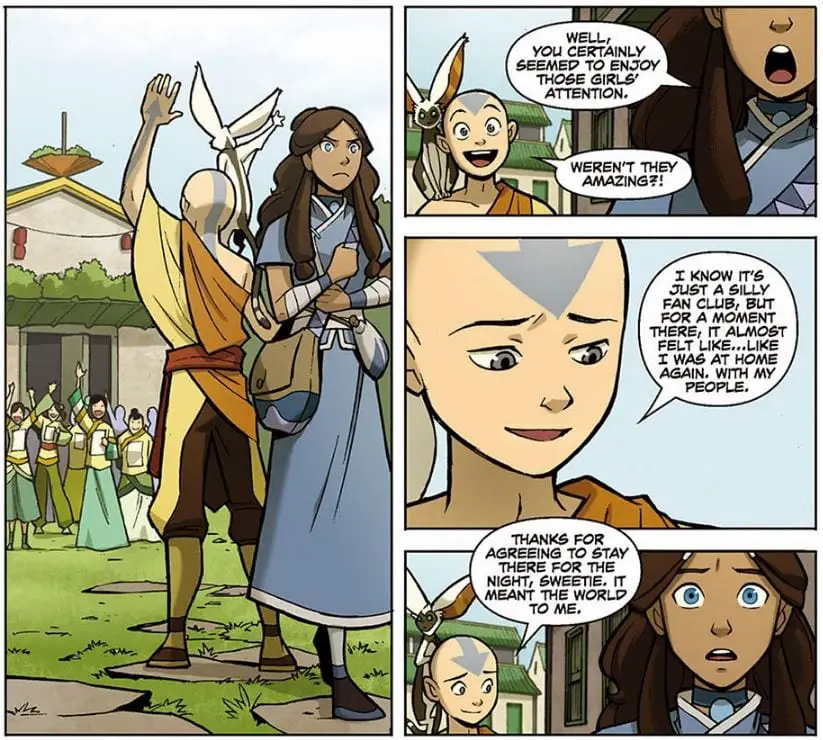
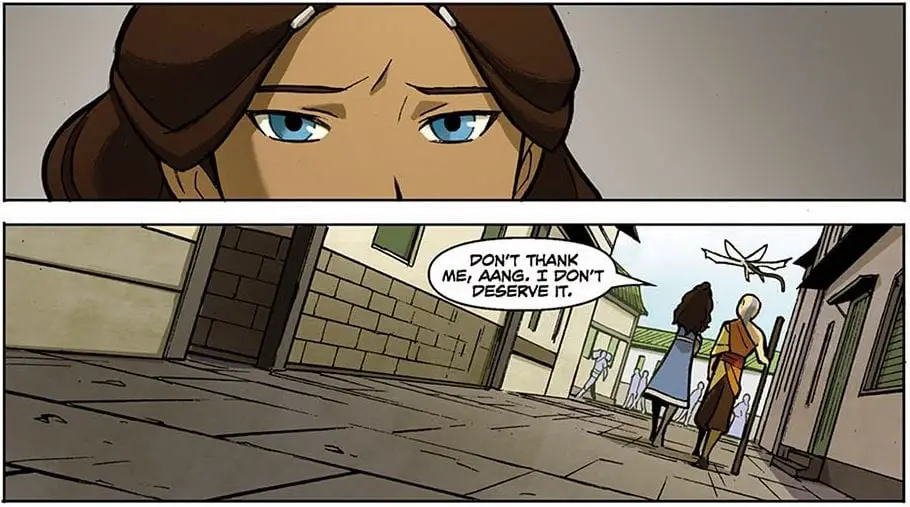
I’m sorry, this amazing, adult communication is blowing me away. But hey, at least Katara got her time to shine in North and South, right?
Then, sadly, The Legend of Korra furthered this discomfort as well. Jana lays it out once again:
“Zuko and Toph get to be active parts of the narrative at different points throughout LoK. Katara only ever gets carted out when Korra needs high-class healing, and even there Katara kinda fails both times. Even though the whole bending blocking should have been totally reversible by using blood bending in return, yet when we see Katara try, it’s not even night. Did the writers just forget she had the ability? Though she did give thematically poignant advice during ’Korra Alone.’”
I do happen to think this implication was entirely unintended, since I’m of the mind that Katara was originally the only member of the Gaang who was still supposed to be alive, at least back in Book 1. But it is there, and quite unfortunate, which matters.
Did Katara want to do anything other than sit in a healing hut and be known for having Aang’s kids? Because it sort of seemed like she was an agent of change herself during ATLA’s run. Especially with her whole willingness to go to extremes at times, and her stubbornness, and the darker aspects of her personality…
Though who needs that, when we can have these fist-pumping character moments:
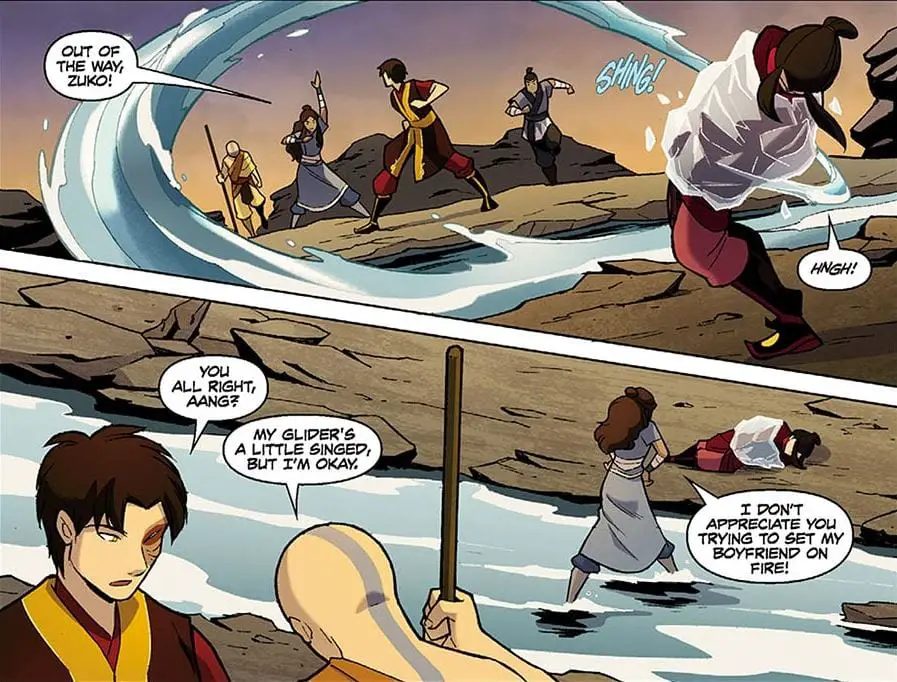
It’s honestly so bad that I can’t even look at Gurihiru’s rendering of her.
Aang, Entitled
However, it’s not like my issues with Kataang stem only from “what Katara deserved.” Because it’s not as though the dynamic where one person’s desires are completely secondary (or taken out of consideration all together) are good for the other person in the relationship. Yes, in this case, there’s the gendered element of it that’s upsetting (and one of my biggest pet peeves). Frankly, the male entitlement implication of that narrative is also reflected within the story by Aang’s approach to his relationship with Katara.
See, he started out the show having a crush on her. It was presented as a rather childlike infatuation, but it’s not exactly that odd. Throughout the show’s run, he seemed to have a bit of an idealized view of her, and in the moments she’d violate that, he’d grow frustrated. Again, normal and something you learn as you grow up. You begin to understand that people won’t act the ways you want them to, since they’re their own individuals.
The clearest example is in “The Southern Raiders,” where Katara is presented with the opportunity to track down the man that killed her mother, presumably to get revenge. Aang tells Katara what she should do, and explains how what she wants isn’t the answer. Contrasted to how Katara manages his anger over losing Appa in “The Desert,” the disparity is striking.
Aang: [screaming] I’m sorry, okay! It’s a desert cloud; I did all I could! What’s anyone else doing?! [Pointing his staff at Katara.] What are you doing?!
Katara: Trying to keep everyone together.
You’ll spend a long time looking for her condescending tones. “Anger won’t help, Aang,” Katara never said, because she got that he was processing something painful and needed to sort it out himself. This difference in behavior is something that would be really fitting for a 12-year-old boy to learn and come to understand. There’s just no indication he ever did.
In “Nightmares and Daydreams,” Aang hallucinates a sort of ‘dream girl’ Katara, who is incredibly receptive to cliche rom-com declarations of love. I have to assume “Ember Island Players” was meant to be a challenge to this, at least in its conception. In it, Aang watches a parody play of his life for the past year (it’s perfection), and gets immediately angry when the Katara on stage flirts with ‘Zuko.’ When the actor says, “Wait! You’re the Avatar’s girl, aren’t you?”, Aang agrees. Katara is his.

And then the very next scene when he tries to kiss Katara, she rejects him, saying that she’s confused. When he demands to know why and won’t let it go, she gets annoyed. Good.
But… Again, we all know the ending. Katara comes out, blushes prettily at him, says no words, and they make out.
How is this good for him? How is this good for anyone? God, at least show his growth. He was upset about having made Katara uncomfortable in “Ember Island Players,” even calling himself an “idiot” when she grew visibly frustrated with his insistence on pursuing something romantic with her right then. Shouldn’t he want to have made sure she was on-board? Isn’t the point that she doesn’t belong to him, but is her own person with her own wants and needs? Isn’t consent supposed to be sexy?!
Instead, what we get is this:
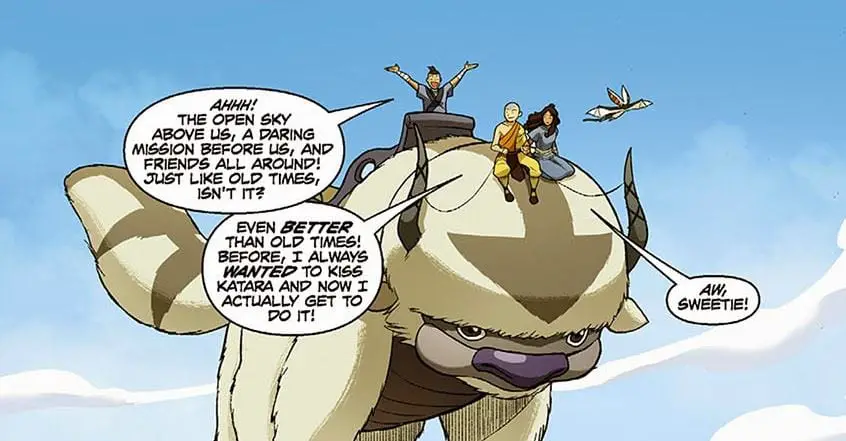
Neat. He got what he wanted! “What did he learn?” said no one ever. “How does Katara feel?” said anyone who watched the pilot of Korra.

As a convincing, romantic tale, what we’re given just…doesn’t work. It’s the story of a woman who swallows everything lest the man she’s interested in has to actually learn anything about his behavior that violates her boundaries. It’s not like it would have even taken much to fix this, but especially given how young they were when they got together, with more reflection, it seems like a match that shouldn’t have worked out.
Dysfunction Junction
And yet, on some level, perhaps Avatar creators Bryan Konietzko and Michael Dante DiMartino knew this too. Because when they sat down to hammer out the Kataang offspring, boy did they do a number.
You see, Bumi, Kya, and Tenzin each have their fair share of inadequacy issues, courtesy of their respective relationships to their father.
As a nonbender, Bumi seemed to have felt enormous guilt about how he could never live up to his dad’s expectations, even going as far as to question if Aang would have been proud of him. In his sixties. When he served most of his life as a commander for the United Forces. He also said he never felt like he was truly part of the Air Nation, despite being Aang’s son.
“Welcome to the ‘I disappoint Dad’ club!”
Kya had her waterbending as a way to escape the crushing nonbending guilt Bumi faced, and seemed to be quite close to Katara as a result. She even moved herself to the South Pole to keep her mom company once Aang had passed away. However, we also know she spent years wandering around trying to “find herself,” probably feeling as though she had no place in the world given her mixed identity and the political importance of Aang/the Air Nation, while also having a canonical fear of commitment and family.
Tenzin: Kya, we’re your brothers. You must remember, before the fog infects you.
Kya: No, you’re just a vision. I have no family. You can’t tie me down!
And Tenzin, oh gods, poor Tenzin. He has the entire burden of the Air Nation on him as the only airbender of the family, and takes his duty so seriously that he stresses himself to the point where he is unable to form a true spiritual connection, clearly a result of his crippling anxiety over the fear of not measuring up.
“You must stay focused. Remember who you are Tenzin. You are the son of Avatar Aang. You are the hope for future generations of airbenders. The fate of the world rests on your shoulders. But what if I fail? [Looks around.] Then your father’s hopes of the future dies with you. I can’t fail. You will. [Covering his ears, while sagging to the ground, arguing with himself.] Ah, stop it! I am the son of Avatar Aang. I am the hope for future generations of airbenders. I am the son of Avatar Aang!”
I’m 100% sure Aang and Katara did the best they could as parents, and there’s no doubt in my mind that they were loving and tried to offer support. However, the line that probably sums up the root of these issues comes from Kya:
“See what [Tenzin’s] doing there, Bumi? Classic airbender technique. Cutting and running when things get tough!”
Because…yeah, that’s Aang’s reaction. He avoids and evades and takes off to go be by himself so he can gain perspective. We see this multiple times across every medium. Good thing he didn’t end up with the one character from ATLA that has a canonical fear of abandonment, right?
This isn’t all *on him*, nor is it like Katara just ignored her kids. Sometimes, it doesn’t matter how available a parent makes themself—their kid is going to be hurt by the other’s actions. And for Aang, there was the weight of a culture on him. He did have what he felt was a duty to his people to rebuild everything. He also had a duty to Republic City, which as Kya smartly points out, kept him from giving his children the attention they craved.
“Tenzin, your problem is you’re exactly like dad. He was so focused on saving the world and doing his duty, [To Bumi] don’t laugh, [To Tenzin] that he never had time for us.”
But, it’s not like there’s really an answer! Aang had kids, and yet he was still the Avatar. Tenzin has kids, and yet still is the only airbending master. It’s complicated and meant to be.
However, given what we got with Kataang, it is also completely unsurprising that Aang and Katara’s parenthood/adult life was defined by a lack of communication and emotional availability, at least from what we can tell. This also puts Katara’s choice to immediately move back to the South Pole once Aang died in perspective; perhaps the city he poured all his energy into, at the cost of his family, held some bitter memories.
A Beautiful Mess
This is just so…heavy. And yet everything makes perfect sense, and created what I would consider one of the most compelling plotlines in Korra’s narrative: the breakdown of childhood idealization.
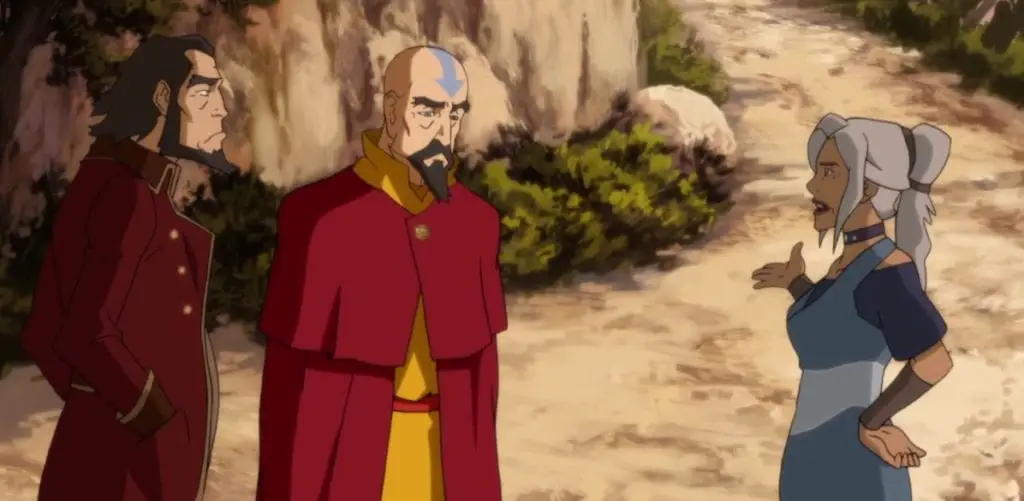
From a Watsonian perspective, there’s few gaps that need to be filled in. Katara and Aang did legitimately like each other, and perhaps being kids fighting in a war wasn’t conducive to the healthiest perspectives on relationships. They got together, in some ways feeling like that’s what made sense or should happen, in others because hey, there was a love there. Then they didn’t break up, because they both are incredibly conflict adverse. Aang runs off, and Katara swallows her feelings. Plus, again, they do like each other. They wouldn’t want to have caused hurt to one another. They also both wanted to see the Air Nation come back.
I imagine their marriage to be a bit like what’s proposed in “Marry Me A Little” by Stephen Sondheim.
“Oh how gently we’ll talk. Oh how softly we’ll tread. All the stings, the ugly things, we’ll keep unsaid.”
Coming from the perspective of two kids who are victims of genocide and an imperialist war that are trying to do the right thing and rebuild for the sake of the world, rather than a jaded 30-something with bad dating luck, this outlook is jarring, and quite bleak. It’s messy, at its core.
However, it’s that mess which fuels the Doylist reason for why this is so perfect. Because the Kataang narrative showed us that not everything has to stay pleasant. Not every family, even with parents who, as we all know, are wonderful and loving people, will have a healthy dynamic. And sometimes that mess can follow you, even into adulthood; even when you have a family of your own. Sometimes you can’t have that honest conversation with your siblings until half your life is spent.
The Kataang dynamic went from feeling remarkable contrived, to being one of the most brutally true-to-life. As much as I want “better” for Katara and Aang, or at least more happiness/less anxiety, there’s nothing better that I could want for myself, as a viewer. It’s broken, it’s messy, and it’s intellectually honest. I’ve won the battle over myself. Kataang is my OTP.

